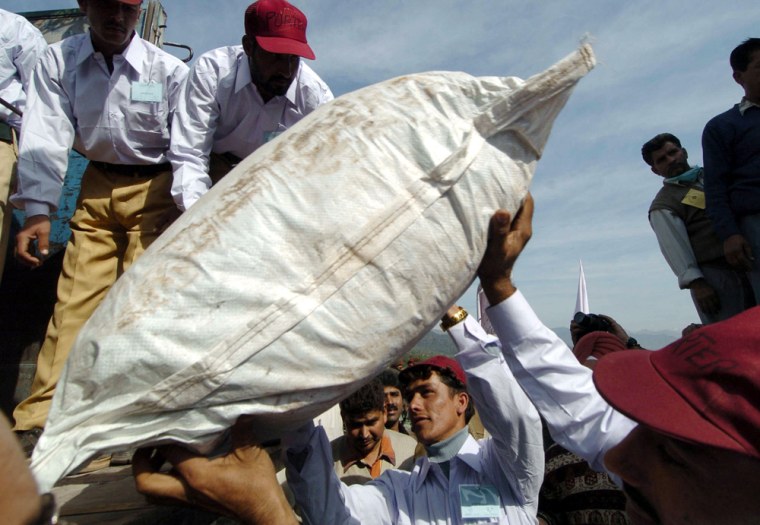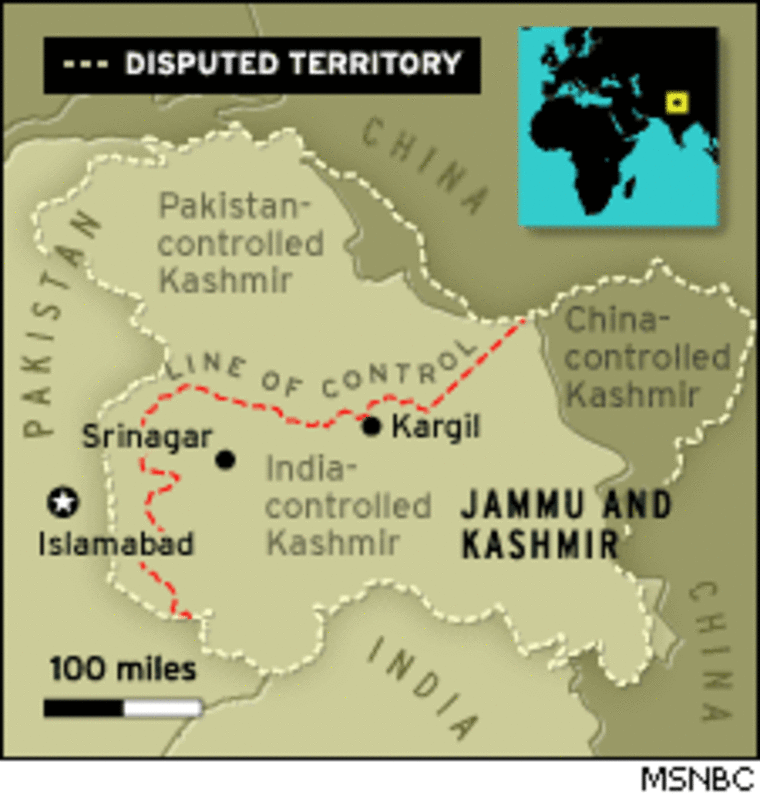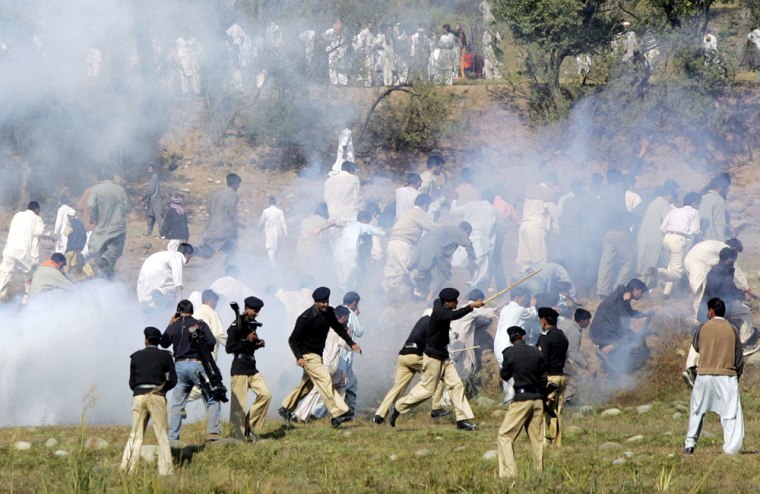India and Pakistan exchanged quake aid Monday at their disputed Kashmir frontier in a mostly symbolic act of cooperation, but the ceremony was marred when police used tear gas on Pakistani villagers trying to cross the border illegally.
Hundreds of villagers on the Pakistani side of the Rawalakot-Punch crossing broke into a chant, “We want an independent Kashmir,” and witnesses said two men clutching young boys in their arms tried to dash over to the Indian side of the divided Himalayan region.
“Some enthusiasts tried to cross. It’s a military zone and we fired tear gas as we didn’t want anyone to lose a limb,” Pakistani Army Brig. Gen. Tahir Naqvi, the area commander, said, adding that while the area had been cleared of land mines, “You don’t want to take chances.”
A couple of shots of gunfire, possibly warning shots, also appeared to ring out, though police denied they had fired anything but tear gas canisters.
The two men were arrested, witnesses at the scene said. The villagers dispersed and pulled back about yards from the crossing.
Hand shake starts exchange
Earlier, India began handing over tents, food and medicine to Pakistan as part of a much-heralded partial opening of their frontier, following the region’s devastating Oct. 8 earthquake.
Naqvi shook hands with Indian Col. Santnu Ghose across a white line painted at the crossing set up near the Punch River, and they declared it open for aid exchanges.

Trucks then backed up to the line, and porters from the Indian side handed the first batch of aid — sacks packed with tents — to counterparts on the Pakistani side, who loaded them on their truck. Several other trucks stood at the ready.
“It’s definitely a historical moment,” said Braj Raj Sharma, a top civilian official in India’s Jammu-Kashmir state. “They say that adversity unites people. This is what is happening today.”
Sharma said the 25 truckloads of Indian aid included tents, tarpaulins, sugar, butter and medicine. Pakistani officials said a single truckload of aid from Pakistan also would be handed over to India.
The 7.6-magnitude temblor killed about 80,000 people — most of them in northern Pakistan but also 1,350 in India’s portion of divided Kashmir.
Opening was scaled back
The border opening that the two sides agreed to last month was supposed to have been a much grander gesture: letting civilians of divided Kashmir cross at five points to check on long-lost relatives and visit relief camps set up along the frontier.
But India on Saturday said it was prepared to open only one crossing, and on Sunday officials on both sides said bureaucratic wrangling would delay chances for people to cross, partly because India was concerned that Muslim militants might head into Indian territory.
Sharma said once-a-week crossings of civilians should be allowed in about a week and that an additional frontier point, the Tattapani-Meandher crossing, should be open by then.
No villagers from India’s side attended the aid exchange because of tight security there.
Many of the villagers on the Pakistani side said they want to be ruled neither by India or Pakistan, and demanded that the region be united. Mohammed Saleem Kiana, 58, called exchange of aid “just a drama.”
“If we can’t go in there,” he said pointing to the Indian side, “then it does not make much difference for us.”
History of the split
Predominantly Muslim Kashmir was split between Hindu-dominated India and Muslim-dominated Pakistan after independence from Britain in 1947. Both countries claim all of Kashmir in a dispute that has sparked two wars and kept families separated for more than half a century.

Many Kashmiris have said they want to cross the border, called the Line of Control, to see if relatives on the other side survived the Oct. 8 quake.
As part of their agreement, Pakistan and India agreed to exchange lists of people intending to cross. An Indian military official, speaking on condition of anonymity because he wasn’t authorized to speak to the media, has said the names need to be scrutinized to ensure they don’t include militants.
Nov. 14 new goal
Sharma said lists would be exchanged in three or four days, and that the first crossings should be approved by Nov. 14. Priority would be given to members of divided families, “but in time other people will be allowed to cross,” he said.
Mohammed Fiaz, a 35-year-old preacher watching from Pakistan’s side of the border crossing, said he was hopeful people could cross soon.
“After a few more days, families who have been apart for 60 years can finally meet each other,” he said.
Indian and Pakistani forces regularly exchanged fire across the de facto border until agreeing to a cease-fire two years ago. In a peace process started last year, the neighbors started a tightly controlled bus service allowing some Kashmiris to cross, but the buses were shut down by the quake.
